| Srl | Item |
| 1 |
ID:
178532
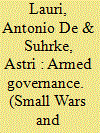

|
|
|
|
|
| Summary/Abstract |
This article examines the genealogy and behavior of the CIA militias in Afghanistan against the backdrop of persistent armed governance whereby a plurality of actors competes over control and rule. The nonaccountable use of force by militias and their volatile alliances increase the extent of armed governance, exacerbating issues of human rights abuses and undermining the possibility of future claims for justice. We discuss the effects of recurrent political violence on the peace talks and the implications for a sustainable peace, the need to include a solution for the role of militias in a peace agreement, and the necessity of ending impunity.
|
|
|
|
|
|
|
|
|
|
|
|
|
|
|
|
| 2 |
ID:
131875
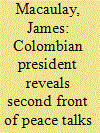

|
|
|
| 3 |
ID:
126877
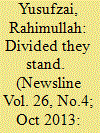

|
|
|
|
|
| Publication |
2013.
|
| Summary/Abstract |
As fissures on both the government and the militants side, serious doubts are being expressed about whether the dialogue between the two will materialise.
|
|
|
|
|
|
|
|
|
|
|
|
|
|
|
|
| 4 |
ID:
152023
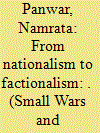

|
|
|
|
|
| Summary/Abstract |
Do ceasefires or peace talks create fragmentation in the insurgent groups? Rather than proposing claims that can offer predictions about armed groups behaviour under ceasefires or peace processes, the analysts tend to focus largely on the dynamics between state and non-state actor. The experts pay little attention to overtime changes in social and local political context which might contribute to propelling a rebel group towards fragmentation and factionalism. The present study intends to fill this gap by exploring the shifting role of public opinion and ethnic support for the peace talks to ascertain whether it can increase the likelihood of factionalism in rebel groups or not. This article applies this approach to the case of Naga National Movement (1947–2015) in India, and finds that the proposed variable appears to have increased the frequency of factionalism in the movement.
|
|
|
|
|
|
|
|
|
|
|
|
|
|
|
|
| 5 |
ID:
171047
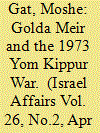

|
|
|
|
|
| Summary/Abstract |
Most historians blame Israeli Prime Minister Golda Meir for the outbreak of the 1973 Yom Kippur War, having allegedly rejected all peace proposals made by Egyptian President Anwar Sadat. In fact, Sadat was adamantly opposed to Meir’s demand for direct negotiations, envisaging political settlement as an American dictate on Israel. The Yom Kippur War shook both sides of their intransigence and brought them closer to each other’s position.
|
|
|
|
|
|
|
|
|
|
|
|
|
|
|
|
| 6 |
ID:
172316
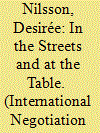

|
|
|
|
|
| Summary/Abstract |
When bringing armed conflicts to a peaceful end, the inclusion of civil society in peacemaking is a vital task. However, whereas previous research on civil society inclusion has made significant advancements, surprisingly little attention has been paid to analyzing how civil resistance and mass action may interact with more elite-driven approaches during peace processes. This study addresses this research gap by examining the interplay between elite and mass-based civil society approaches in three different peace processes in civil wars in Africa in the post-Cold War period: Liberia, the Central African Republic (CAR), and Burundi. We advance the literature by developing a framework that focuses on coordination of these different efforts and we explore this interplay empirically. With this study, we aim to broaden the research agenda, allowing for future synergies at the research frontier of mass action and the inclusion of civil society in peace processes.
|
|
|
|
|
|
|
|
|
|
|
|
|
|
|
|
| 7 |
ID:
123173
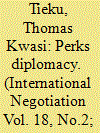

|
|
|
|
|
| Publication |
2013.
|
| Summary/Abstract |
Abstract This article examines impacts of luxurious perks, such as paid daily allowances on peace talks. It draws on the case of the Burundian peace processes held in Arusha, Tanzania and the Seventh Round of the Inter-Sudanese Peace Talks held in Abuja, Nigeria to show that perks can unintentionally prolong peace talks. Perks bestowed on delegates to the talks seduced the conflicting parties away from whatever interest they might have had in actually reaching an agreement. For some, living free of charge in five-star hotels and receiving the equivalent of five months' pay in one week of per diems made continued talks more attractive than achieving peace. Many of the feuding parties found the perks of greater value for their effort - or rather, lack thereof - and they shared an incentive to keep the talks going.
|
|
|
|
|
|
|
|
|
|
|
|
|
|
|
|
| 8 |
ID:
152252
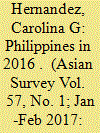

|
|
|
|
|
| Summary/Abstract |
This article explains why the Philippines, a small country and a long-time US ally, shook the world in 2016 by democratically electing a president who has defied conventional expectations, touched the lives of ordinary Filipinos, been accused of human rights violations in his war on drugs, and could affect the geostrategic rivalry between the US and China.
|
|
|
|
|
|
|
|
|
|
|
|
|
|
|
|
| 9 |
ID:
139696
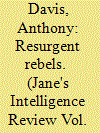

|
|
|
| 10 |
ID:
129623


|
|
|
| 11 |
ID:
139343
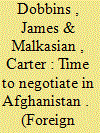

|
|
|
|
|
| Summary/Abstract |
Peace talks, if not peace itself, may be close at hand in Afghanistan. Over the past few months, Afghanistan, Pakistan, and the Afghan Taliban have made unexpected strides toward talks. In early May, members of the Taliban and the Afghan government even met in Qatar and expressed real interest in starting official negotiations—a heartening step.
|
|
|
|
|
|
|
|
|
|
|
|
|
|
|
|
| 12 |
ID:
126876


|
|
|
| 13 |
ID:
065934
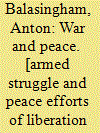

|
|
|
|
|
| Publication |
Mitcham, Fairmax Publishing, 2004.
|
| Description |
x, 513p.pbk
|
| Standard Number |
1903679052
|
|
|
|
|
|
|
|
|
|
|
|
Copies: C:1/I:0,R:0,Q:0
Circulation
| Accession# | Call# | Current Location | Status | Policy | Location |
| 051052 | 954.93032/BAL 051052 | Main | On Shelf | General | |
|
|
|
|
| 14 |
ID:
152962
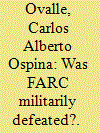

|
|
|
|
|
| Summary/Abstract |
The concept of military victory has become opaque and quite different from the days of the industrial wars. Full military victory through total annihilation of the enemy has yielded to more complex ways of achieving political objectives. Eventually the understanding of the fact that the war is unwinnable on martial terms shifts insurgent strategy to one of survival, normally peace talks. It is this very shift of strategy, albeit the absence of insurgent annihilation, that constitutes the core of military victory for the government. Politicians and decision makers, if not military forces, blinded by the victory idea of the past, are unable to understand this reality. Hence, when peace talks are held, they are approached as the end of conflict rather than a shift to war by other means. This gives the upper hand to the insurgents.
|
|
|
|
|
|
|
|
|
|
|
|
|
|
|
|